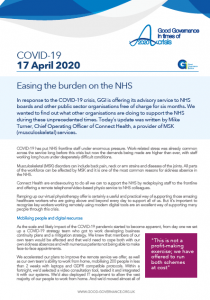Easing the burden on the NHS
17 April 2020

In response to the COVID-19 crisis, GGI is offering its advisory service to NHS boards and other public sector organisations free of charge for six months. We wanted to find out what other organisations are doing to support the NHS during these unprecedented times. Today’s update was written by Mike Turner, Chief Operating Officer of Connect Health, a provider of MSK (musculoskeletal) services.
COVID-19 has put NHS frontline staff under enormous pressure. Work-related stress was already common across the service long before this crisis but now the demands being made are higher than ever, with staff working long hours under desperately difficult conditions.
Musculoskeletal (MSK) disorders can include back pain, neck or arm strains and diseases of the joints. All parts of the workforce can be affected by MSK and it is one of the most common reasons for sickness absence in the NHS.
Connect Health is endeavouring to do all we can to support the NHS by redeploying staff to the frontline and offering a remote telephone/video-based physio service to NHS colleagues.
Ramping up our virtual physiotherapy offer is certainly a useful and practical way of supporting those amazing healthcare workers who are going above and beyond every day to support all of us. But it’s important to recognise key workers working remotely using modern digital tools are an excellent way of supporting many people through this crisis.
Mobilising people and digital resources
As the scale and likely impact of the COVID-19 pandemic started to become apparent, from day one we set up a COVID-19 strategy team who got to work developing business continuity plans and a mitigation strategy. We knew that members of our own team would be affected and that we’d need to cope both with our own sickness absences and with numerous patients not being able to make face-to-face appointments.
We accelerated our plans to improve the remote service we offer, as well as our own team’s ability to work from home, mobilising 200 people in less than 2 weeks with laptops and GDPR compatible protocols. Within a fortnight, we’d selected a video consultation tool, tested it and integrated it with our systems. We’d also deployed IT equipment to allow the vast majority of our people to work from home. And we’d moved almost all of our patient appointments to virtual consultations. As with many of our NHS partners, these changes have been implemented rapidly, enabled by successful collaboration with a diverse range of teams and organisations.
Connect Health has also introduced an additional digital self-assessment tool - PhysioNow - as we continue to invest resources into ground-breaking AI technologies in order to improve accessibility and patient choice. The app provides accurate triage to virtual services or self-management, if appropriate. The tailored clinical content and powerful decision trees accurately evaluate and direct the patient to the right treatment pathway, all audited to feedback and improve patient experience.
Single-contact community support
As we slowly recover from this crisis, we are rightly concerned about the tens of thousands of patients whose treatment has been quite understandably disrupted due to COVID-19. Connect Health delivers NHS Community MSK services (including physiotherapy, MSK, persistent pain and rheumatology) covering more than 10% of England’s population and Occupational Health Physiotherapy Services to over 50 large employers. We know first-hand the importance of prevention and early intervention in effectively managing MSK disorders.
Our founder and executive chair Professor Andrew Walton is also chair of the trade association for independent providers – the MSK Partners Network. Andrew has been made aware that those working outside the NHS on the high street, whether large or small providers, have typically seen up to 90% reduction in activity - placing many physiotherapy businesses at risk and with under-utilised staff. The proposal of a national single-contact community MSK service, will ease the burden on its emergency departments and the 111 service by handling up to 200,000 patients per month. We could coordinate and deploy this service within four weeks, phasing it in region by region.
We’ve proposed this to NHS England and to our existing 26 CCGs and many have expressed interest – although of course their immediate overwhelming focus is on COVID-19 direct response.
This is not a profit-making exercise; we have offered to run both schemes at cost. Our focus is on easing the burden on hard-pressed NHS staff, offering care to patients who might otherwise not be seen for months, and helping to protect clinicians and livelihoods.
What is your organisation doing to help the NHS rise to the extraordinary challenge of COVID-19? As ever, we are interested to hear perspectives and experiences of those within the public sector and beyond. If you have any questions or comments prompted by this briefing, please call us on 07732 681120 or email advice@good-governance.org.uk. We will aim to respond within 24 hours.

